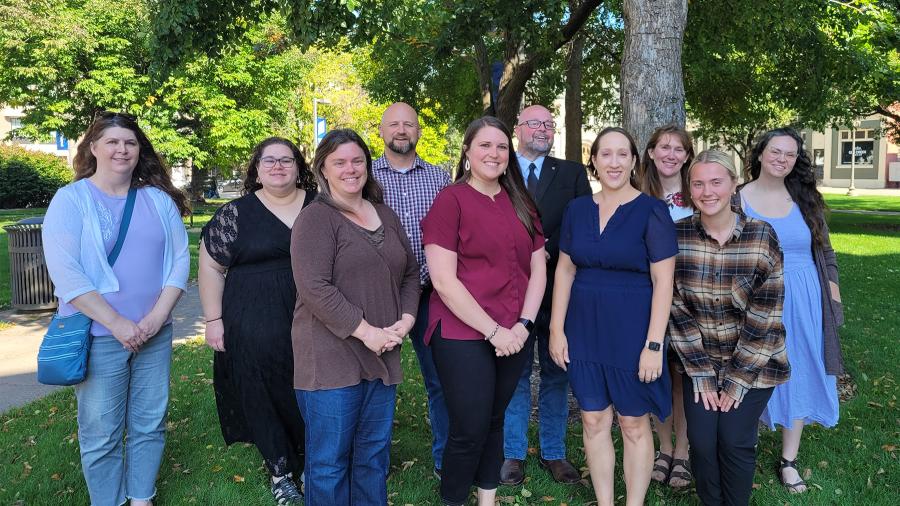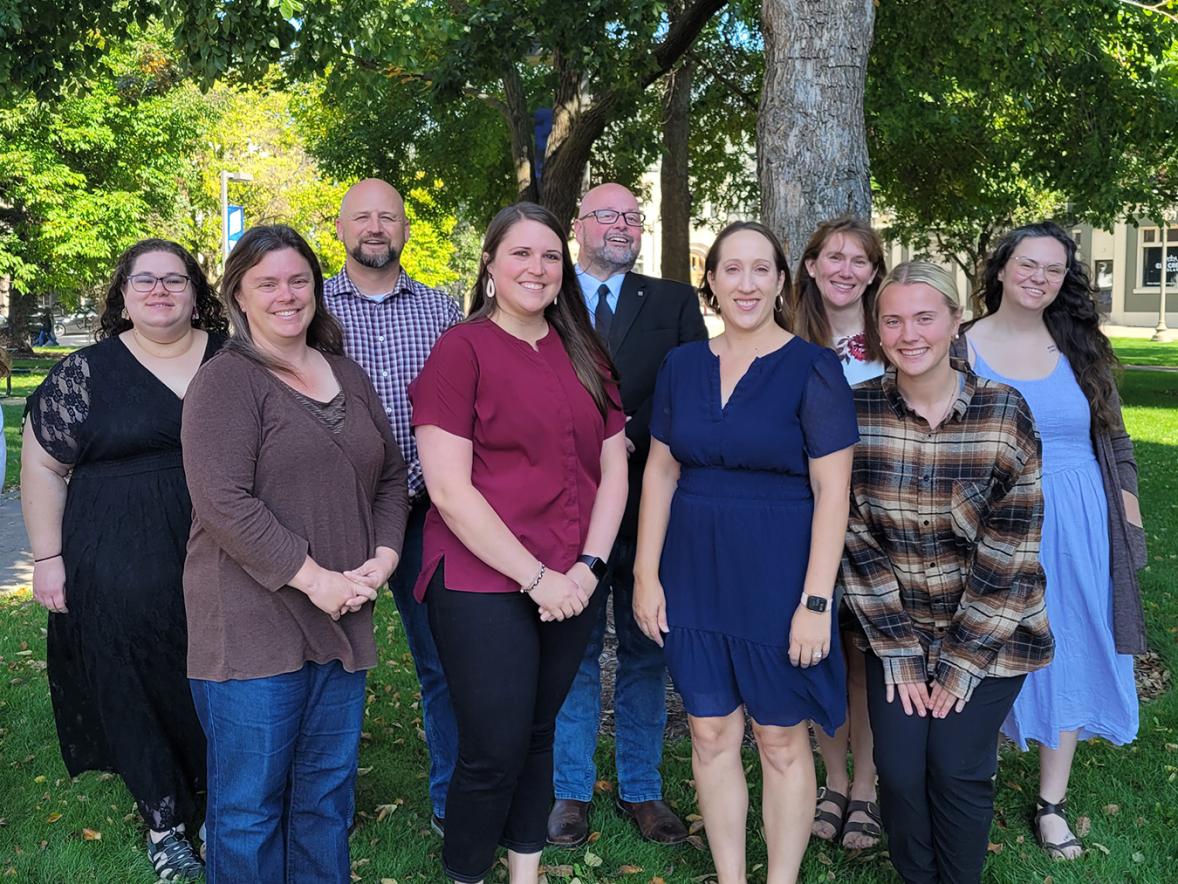A national organization has honored the Stout Vocational Rehabilitation Institute (SVRI) at UW-Stout for its nearly 60-year record of advancing the field of rehabilitation, which has helped tens of thousands of people with disabilities – as well as thousands of rehabilitation professionals – in all 50 states.
The National Rehabilitation Association presented SVRI with the annual W.F. Faulkes Award during its fall conference on Oct. 2. The legacy award was given in recognition of SVRI’s evidence-based research, innovative program designs and techniques, and for its high-impact technical assistance in transforming systems, improving outcomes, and removing barriers to employment for people with disabilities.

“On behalf of UW-Stout, Chancellor Katherine Frank, and our team at SVRI, thank you. This award is truly a team award and honors the historic legacy and cumulative accomplishments and contributions of everyone who has been a part of SVRI for several decades. We’re standing on the shoulders of giants as we continue to advance their work,” Executive Director Kyle Walker said.
“Congratulations, team members, past and present. Thank you all for the work you are doing or have done to advance the thriving, flourishing and full inclusion of people with disabilities,” he added.
Attending the virtual award ceremony were Walker, SVRI’s Director of Research Cayte Anderson, Director of Education Beth Gaertner, Director of Client Services Kyle Schemenauer, and staff, as well as former executive directors John Wesolek, John Lui and Mary McManus.
The W. F. Faulkes Award was established by the National Rehabilitation Association in 1954 in the name of its founder and first president.
Major national achievements
SVRI was formed in 1966 through federal grants by the Department of Health, Education, and Welfare (now the Department of Education and Department of Health and Human Services). It has led or significantly contributed to numerous national initiatives, including:
- Pathways to Independence
- PROMISE
- The Medicaid Infrastructure Grant
- The Rehabilitation Research and Training Center on Evidence-Based Practice in Vocational Rehabilitation
- The Vocational Rehabilitation Technical Assistance Center on Program Evaluation and Quality Assurance
- The Vocational Rehabilitation Technical Assistance Center on Targeted Communities
- The Vocational Rehabilitation Technical Assistance Center for Quality Employment
- The Accelerated Disability Initiative Fund project
- The provision of technical assistance through the Pathways to Partnerships Model Demonstration Project
These projects have produced tools, training, and resources that improve vocational rehabilitation service quality and employment outcomes for people with disabilities.
Innovation: Eligibility and Order of Selection Unit
SVRI’s groundbreaking innovations include the Eligibility and Order of Selection (EOS) Unit, recognized as a national model for improving efficiency and equity in the vocational rehabilitation eligibility processes.
EOS is a pioneering service model that centralizes eligibility determinations using highly trained rehabilitation counselors, standardized assessment protocols and data-driven tools.
It improves timeliness and consistency in eligibility decisions; ensures equitable application of order of selection criteria; frees frontline counselors to focus on employment planning; and generates quality assurance data to enhance compliance and practice.
Impact and prevention of disability-related barriers
SVRI’s work addresses both direct service improvement and prevention of secondary disabilities through early intervention efforts such as PROMISE and Pathways to Partnerships.
By connecting youth and adults with disabilities to education, training and competitive integrated employment, SVRI helps reduce long-term unemployment, poverty and social isolation. Its projects have reached all 50 states, trained thousands of vocational rehabilitation professionals, and improved employment outcomes for tens of thousands of individuals with disabilities.
SVRI’s contributions are cited in policy discussions and incorporated into state and national vocational rehabilitation systems, making a lasting impact on service delivery and rehabilitation practice.
More about SVRI
SVRI recently released its Annual Performance Report, stating how its services, education and research benefit the university and Menomonie area communities, as well as its partners nationwide.
“SVRI is not a student-facing office, but we have a major impact on the university, the community, and the nation, including through revenue sharing, professional development and national programs,” Walker said.
Highlights of SVRI’s 2025 report include:
- $4,838,963: SVRI revenue
- $781,961: UW-Stout ACA rate share of SVRI revenue
- 14,952: Professionals enrolled in continuing education programs
- 12,591: People with disabilities served by SVRI
- 51: States and territories represented in projects and programs
- 60: SVRI full-time employees
SVRI received a five-year, $8.1M grant for its Accelerated VR Training Program from the U.S. Department of Education last fall.
SVRI offers continuing education opportunities for professionals, such as the Certified Rehabilitation Leader credential through the online National Training Center for Transformational Rehabilitation Leadership program.
It partners with Menomonie’s Project SEARCH to provide area residents with on-campus hands-on internships, work-based learning experiences and career exploration opportunities, as well as training in independent-living skills, such as interpersonal communications, technology, self-advocacy and financial literacy.
SVRI, along with the university’s Child and Family Study Center, Disability Services, and Counseling Center, which provide applied learning experiences to students and offer free services to community members and students, will move to Heritage Hall upon completion of the building’s renovation, which began in early September.
Moving these centers to Heritage Hall will centralize services and make them more accessible for students and the community. A new entrance on the north side of the building will offer privacy and confidentiality, while maintaining the centers’ visible presence in Heritage Hall and ensuring that individuals seeking campus services receive attention to their mental, emotional and behavioral health needs.
UW-Stout’s counseling, rehabilitation and human services department offers five master’s programs, including marriage and family therapy, clinical mental health counseling, rehabilitation counseling, school counseling and school psychology, as well as three undergraduate programs, minors and certificates.






